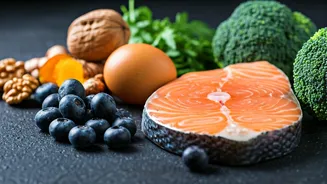Walnuts: Brain's Twin
Walnuts are often hailed as nature's brain food, and for good reason. Their resemblance to the human brain is more than just a coincidence. These nuts are packed
with essential nutrients, including omega-3 fatty acids, which are vital for brain health. Omega-3s support the structure of brain cells, aiding in communication and overall function. Additionally, walnuts are rich in antioxidants, which combat free radicals that can damage brain cells. Regularly consuming walnuts has been linked to improved cognitive performance, including enhanced memory recall and focus. The combination of healthy fats and antioxidants makes walnuts a powerful ally in the fight against age-related cognitive decline. Including a handful of walnuts in your daily diet is an easy and delicious way to give your brain a boost.
Blueberries: Memory Ally
Blueberries are not just a tasty treat; they are also a powerhouse for memory enhancement. These little berries are loaded with antioxidants, specifically anthocyanins, which give them their vibrant color. Anthocyanins have been shown to protect brain cells from oxidative stress and inflammation. Oxidative stress and inflammation are major contributors to memory loss and cognitive decline. Studies have indicated that regular blueberry consumption can improve memory function and delay the onset of age-related cognitive issues. Furthermore, blueberries support blood flow to the brain, providing it with essential oxygen and nutrients, which are critical for optimal cognitive performance. Adding blueberries to your breakfast, snacks, or smoothies is a simple yet effective way to incorporate this memory-boosting food into your routine. They're a sweet, natural, and potent way to care for your brain.
Leafy Greens: Steady Protection
Leafy green vegetables are essential for overall health and are equally beneficial for brain function. Spinach, kale, and other leafy greens are packed with vitamins, minerals, and antioxidants that protect the brain. These vegetables are rich in vitamin K, which plays a crucial role in cognitive function and memory. They also contain folate, another nutrient linked to improved cognitive performance and a reduced risk of cognitive decline. Moreover, leafy greens provide a rich source of antioxidants, helping to protect brain cells from damage. The fiber content in these vegetables supports gut health, which has a significant impact on brain health through the gut-brain axis. Making leafy greens a regular part of your meals is a proactive approach to supporting your brain and preserving cognitive health. Include them in salads, soups, or as side dishes to maximize their benefits.
Fatty Fish: Clarity, Structure
Fatty fish, such as salmon, tuna, and mackerel, are renowned for their high levels of omega-3 fatty acids. These essential fats are critical for brain health, playing a key role in the structure and function of brain cells. Omega-3s support cell membrane integrity, which ensures efficient communication between brain cells. This, in turn, is essential for memory, learning, and overall cognitive function. Fatty fish are also a good source of vitamin D, which has been linked to improved cognitive performance. Consuming fatty fish regularly can enhance memory and potentially reduce the risk of cognitive decline. The high protein content also helps maintain brain cell structure and function. Aim to include fatty fish in your diet at least twice a week to harness their memory-enhancing properties. Enjoy them grilled, baked, or added to salads for a healthy and delicious meal.
Coffee: Alertness, Benefits
For many, coffee is a daily ritual, and it also offers a notable boost to cognitive function. Caffeine, the primary active component in coffee, stimulates the brain, enhancing alertness, focus, and concentration. It blocks adenosine, a neurotransmitter that promotes sleepiness, thereby keeping you more alert. Studies suggest that moderate coffee consumption can also improve memory consolidation, the process by which short-term memories are converted into long-term memories. Moreover, coffee is packed with antioxidants, which can protect brain cells from damage. While coffee can offer several cognitive benefits, it is essential to consume it in moderation. Overconsumption can lead to anxiety, restlessness, and sleep disturbances, which can negatively impact cognitive function. Enjoying a cup or two of coffee daily can be a beneficial addition to your routine.
Dark Chocolate: Bliss, Bloodflow
Dark chocolate, particularly varieties with a high cocoa content, offers a delightful combination of taste and brain benefits. Cocoa is rich in flavonoids, a type of antioxidant that promotes blood flow to the brain. Improved blood flow ensures that the brain receives adequate oxygen and nutrients, which is crucial for cognitive function. Flavonoids have also been linked to improved memory, enhanced focus, and a reduced risk of cognitive decline. Dark chocolate can also stimulate the release of endorphins, which can boost mood and reduce stress. Stress is a significant factor in memory impairment, so any activities that mitigate stress are helpful for maintaining cognitive health. Choosing dark chocolate with a cocoa content of at least 70% is a great way to enjoy this treat while simultaneously supporting your brain. Enjoy it in moderation to reap the benefits without excess sugar or calories.
Pumpkin Seeds: Tiny Vaults
Pumpkin seeds are a nutritional powerhouse, especially for the brain. They are an excellent source of zinc, iron, magnesium, and copper, all of which are essential for brain health. Zinc is critical for nerve signal transmission and is involved in memory formation. Iron is crucial for oxygen transport to the brain, supporting cognitive function. Magnesium is involved in learning and memory processes, while copper plays a role in nerve cell communication. These nutrients work synergistically to support cognitive function and memory. Including pumpkin seeds in your diet is a simple yet effective way to give your brain a nutrient boost. You can add them to salads, trail mixes, or enjoy them as a snack. Their nutty flavor makes them a versatile and tasty addition to various meals, benefiting both your taste buds and your brain.
Whole Grains: Long Game
Whole grains are more than just a source of energy; they are crucial for sustained brain function. They release glucose slowly into the bloodstream, providing a steady supply of energy for the brain. Unlike refined grains, whole grains prevent the energy crashes that can lead to impaired concentration and memory. They are also rich in vitamin E, a potent antioxidant that protects brain cells from damage. The fiber content of whole grains helps regulate blood sugar levels, preventing the spikes and dips that can negatively impact cognitive function. Including whole grains in your diet can support both short-term memory and long-term cognitive health. Choose options like oats, brown rice, quinoa, and whole-wheat bread to provide your brain with the sustained energy it requires. Starting your day with a whole-grain breakfast is a good way to improve your overall cognitive performance.
Eggs: Focus Builder
Eggs are a fantastic source of nutrients that are crucial for brain function, notably choline. Choline is a nutrient that the body uses to create acetylcholine, a neurotransmitter involved in memory and communication between brain cells. Adequate choline intake is associated with improved cognitive performance and memory. Eggs are also rich in other essential nutrients, including B vitamins and antioxidants, all of which support overall brain health. The protein content in eggs contributes to sustained energy levels, preventing the dips that can lead to focus and memory issues. Eggs are versatile and can be prepared in many ways, from scrambled and fried to boiled or poached. Including eggs in your breakfast or as a protein source throughout the day is an easy way to boost your memory and cognitive function.
Turmeric: Golden Healer
Turmeric, a spice popular in Indian cuisine, is a potent brain-boosting agent, thanks to curcumin, its active compound. Curcumin is a powerful antioxidant and anti-inflammatory agent that has been linked to many brain benefits. It can cross the blood-brain barrier, making it readily available for brain cells. Studies suggest that curcumin can improve memory, reduce brain fog, and protect against cognitive decline. It does this by protecting against inflammation and oxidative stress, both of which are common issues in age-related cognitive decline. Adding turmeric to your diet can be as simple as incorporating it into curries, soups, or smoothies. For enhanced absorption, it’s best to consume turmeric with black pepper, as it helps the body absorb curcumin more efficiently. Regular turmeric consumption is a natural and delicious way to support your brain and cognitive health.















